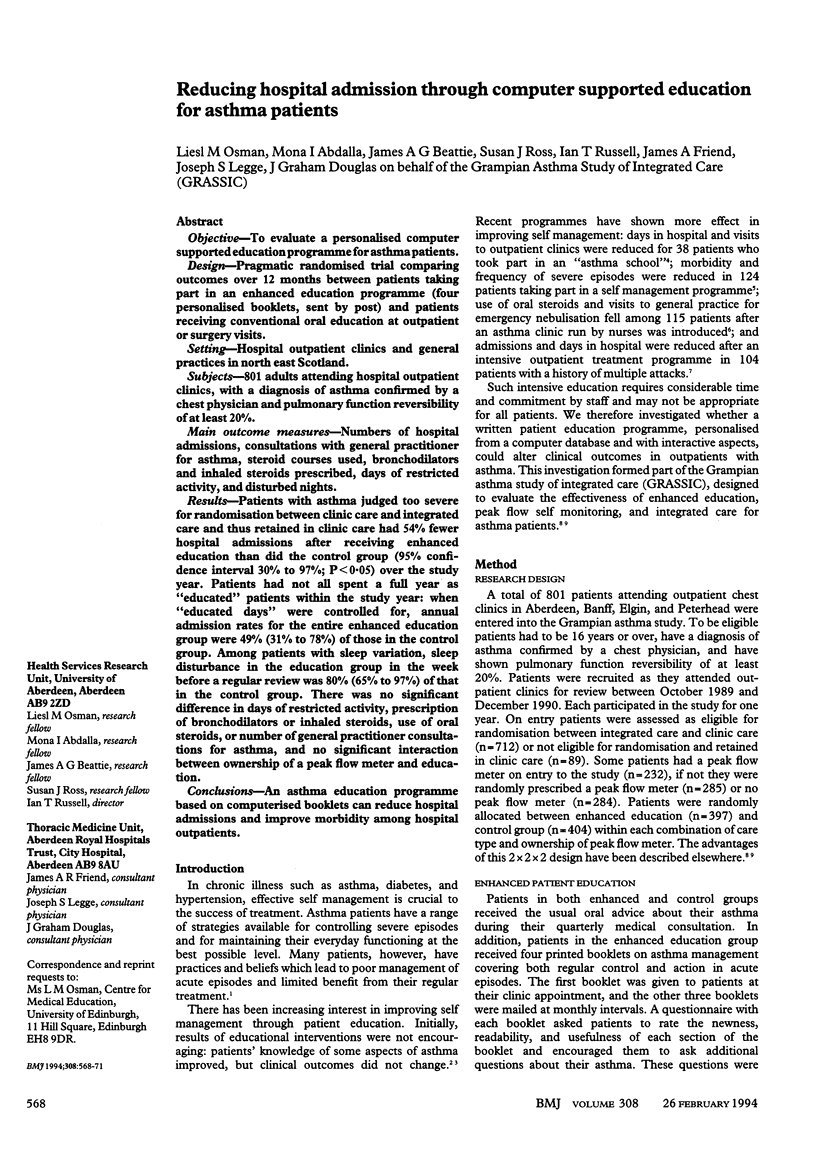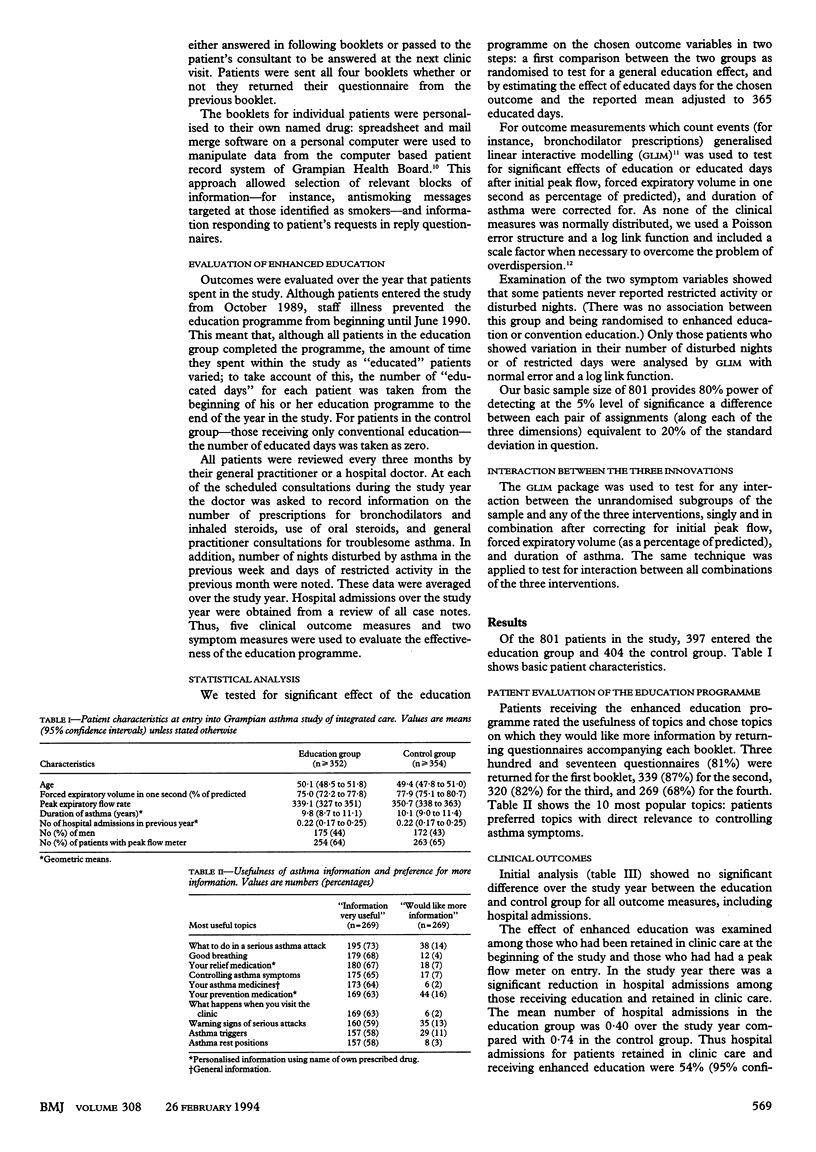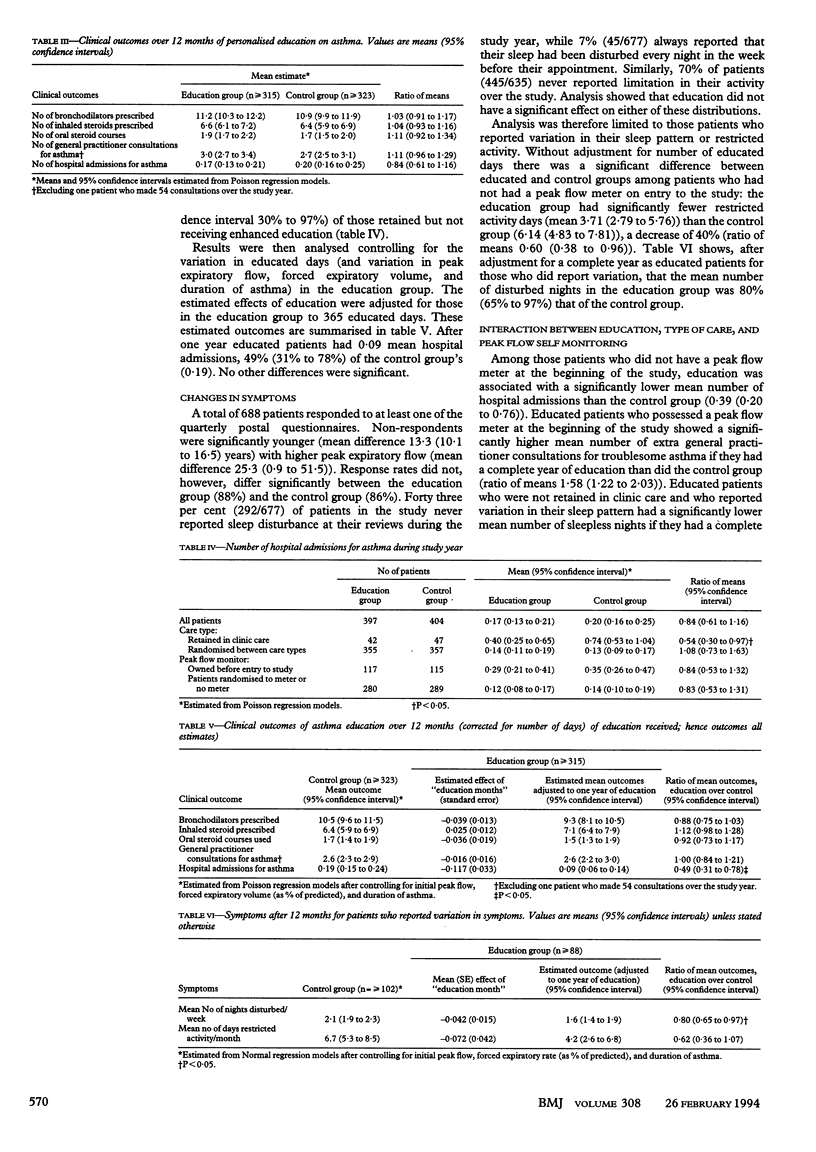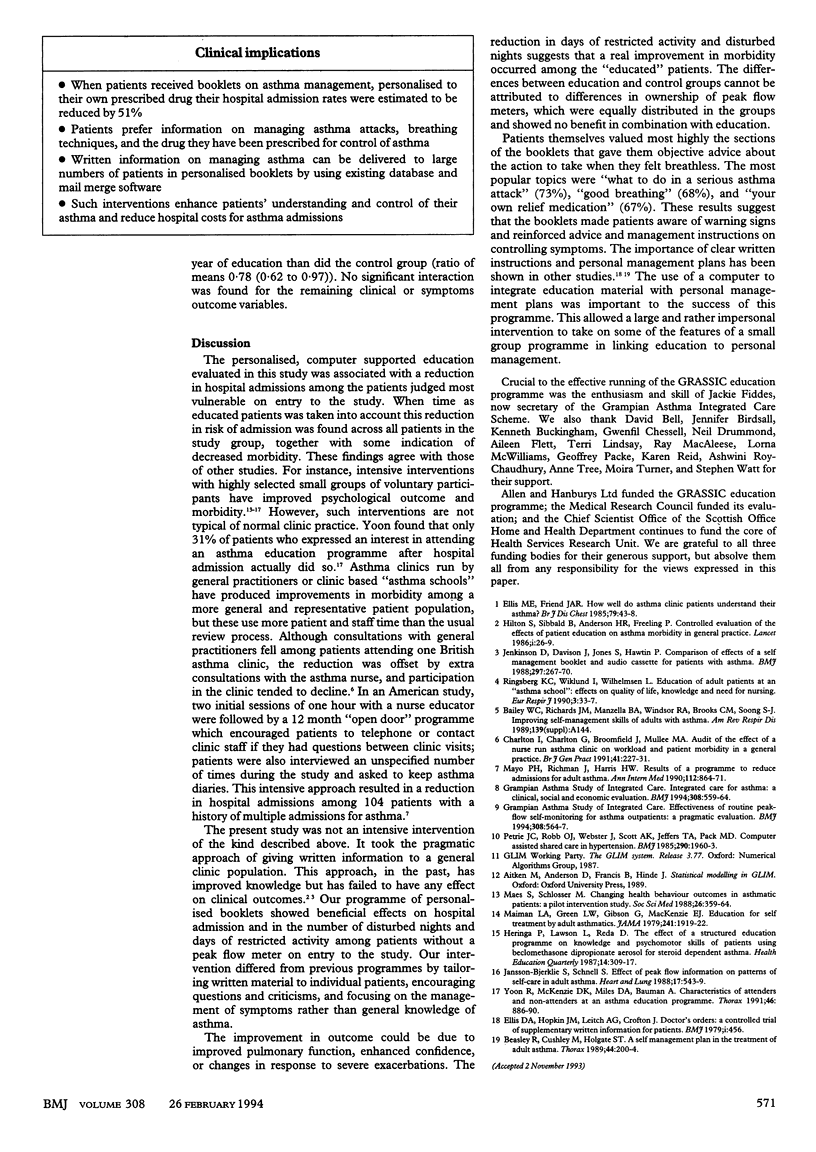Abstract
OBJECTIVE--To evaluate a personalised computer supported education programme for asthma patients. DESIGN--Pragmatic randomised trial comparing outcomes over 12 months between patients taking part in an enhanced education programme (four personalised booklets, sent by post) and patients receiving conventional oral education at outpatient or surgery visits. SETTING--Hospital outpatient clinics and general practices in north east Scotland. SUBJECTS--801 adults attending hospital outpatient clinics, with a diagnosis of asthma confirmed by a chest physician and pulmonary function reversibility of at least 20%. MAIN OUTCOME MEASURES--Numbers of hospital admissions, consultations with general practitioner for asthma, steroid courses used, bronchodilators and inhaled steroids prescribed, days of restricted activity, and disturbed nights. RESULTS--Patients with asthma judged too severe for randomisation between clinic care and integrated care and thus retained in clinic care had 54% fewer hospital admissions after receiving enhanced education than did the control group (95% confidence interval 30% to 97%; P < 0.05) over the study year. Patients had not all spent a full year as "educated" patients within the study year: when "educated days" were controlled for, annual admission rates for the entire enhanced education group were 49% (31% to 78%) of those in the control group. Among patients with sleep variation, sleep disturbance in the education group in the week before a regular review was 80% (65% to 97%) of that in the control group. There was no significant difference in days of restricted activity, prescription of bronchodilators or inhaled steroids, use of oral steroids, or number of general practitioner consultations for asthma, and no significant interaction between ownership of a peak flow meter and education. CONCLUSIONS--An asthma education programme based on computerised booklets can reduce hospital admissions and improve morbidity among hospital outpatients.
Full text
PDF



Selected References
These references are in PubMed. This may not be the complete list of references from this article.
- Beasley R., Cushley M., Holgate S. T. A self management plan in the treatment of adult asthma. Thorax. 1989 Mar;44(3):200–204. doi: 10.1136/thx.44.3.200. [DOI] [PMC free article] [PubMed] [Google Scholar]
- Charlton I., Charlton G., Broomfield J., Mullee M. A. Audit of the effect of a nurse run asthma clinic on workload and patient morbidity in a general practice. Br J Gen Pract. 1991 Jun;41(347):227–231. [PMC free article] [PubMed] [Google Scholar]
- Ellis D. A., Hopkin J. M., Leitch A. G., Crofton J. "Doctors' orders": controlled trial of supplementary, written information for patients. Br Med J. 1979 Feb 17;1(6161):456–456. doi: 10.1136/bmj.1.6161.456. [DOI] [PMC free article] [PubMed] [Google Scholar]
- Ellis M. E., Friend J. A. How well do asthma clinic patients understand their asthma? Br J Dis Chest. 1985 Jan;79(1):43–48. doi: 10.1016/0007-0971(85)90006-3. [DOI] [PubMed] [Google Scholar]
- Heringa P., Lawson L., Reda D. The effect of a structured education program on knowledge and psychomotor skills of patients using beclomethasone dipropionate aerosol for steroid dependent asthma. Health Educ Q. 1987 Fall;14(3):309–317. doi: 10.1177/109019818701400305. [DOI] [PubMed] [Google Scholar]
- Hilton S., Sibbald B., Anderson H. R., Freeling P. Controlled evaluation of the effects of patient education on asthma morbidity in general practice. Lancet. 1986 Jan 4;1(8471):26–29. doi: 10.1016/s0140-6736(86)91904-5. [DOI] [PubMed] [Google Scholar]
- Janson-Bjerklie S., Shnell S. Effect of peak flow information on patterns of self-care in adult asthma. Heart Lung. 1988 Sep;17(5):543–549. [PubMed] [Google Scholar]
- Jenkinson D., Davison J., Jones S., Hawtin P. Comparison of effects of a self management booklet and audiocassette for patients with asthma. BMJ. 1988 Jul 23;297(6643):267–270. doi: 10.1136/bmj.297.6643.267. [DOI] [PMC free article] [PubMed] [Google Scholar]
- Maes S., Schlösser M. Changing health behaviour outcomes in asthmatic patients: a pilot intervention study. Soc Sci Med. 1988;26(3):359–364. doi: 10.1016/0277-9536(88)90401-7. [DOI] [PubMed] [Google Scholar]
- Maiman L. A., Green L. W., Gibson G., MacKenzie E. J. Education for self-treatment by adult asthmatics. JAMA. 1979 May 4;241(18):1919–1922. [PubMed] [Google Scholar]
- Mayo P. H., Richman J., Harris H. W. Results of a program to reduce admissions for adult asthma. Ann Intern Med. 1990 Jun 1;112(11):864–871. doi: 10.7326/0003-4819-112-11-864. [DOI] [PubMed] [Google Scholar]
- Petrie J. C., Robb O. J., Webster J., Scott A. K., Jeffers T. A., Park M. D. Computer assisted shared care in hypertension. Br Med J (Clin Res Ed) 1985 Jun 29;290(6486):1960–1962. doi: 10.1136/bmj.290.6486.1960. [DOI] [PMC free article] [PubMed] [Google Scholar]
- Ringsberg K. C., Wiklund I., Wilhelmsen L. Education of adult patients at an "asthma school": effects on quality of life, knowledge and need for nursing. Eur Respir J. 1990 Jan;3(1):33–37. [PubMed] [Google Scholar]
- Yoon R., McKenzie D. K., Miles D. A., Bauman A. Characteristics of attenders and non-attenders at an asthma education programme. Thorax. 1991 Dec;46(12):886–890. doi: 10.1136/thx.46.12.886. [DOI] [PMC free article] [PubMed] [Google Scholar]


